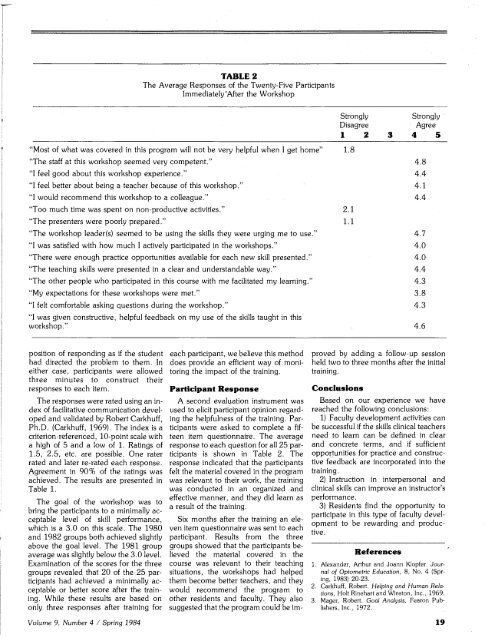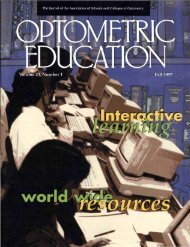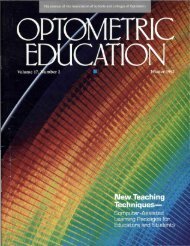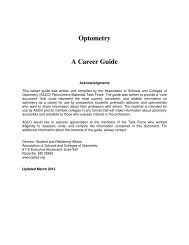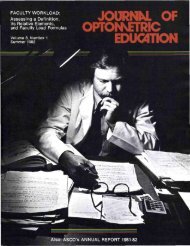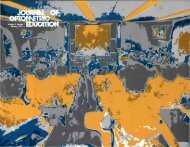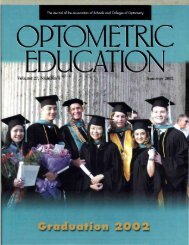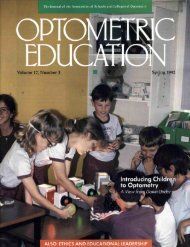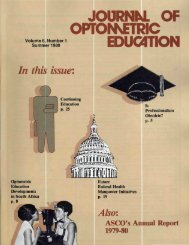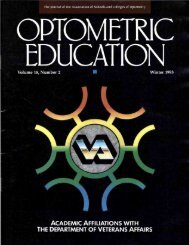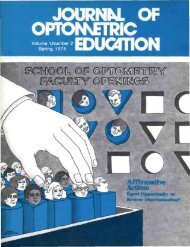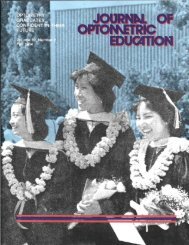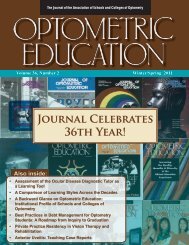Spring 1984, Volume 9, Number 4 - Association of Schools and ...
Spring 1984, Volume 9, Number 4 - Association of Schools and ...
Spring 1984, Volume 9, Number 4 - Association of Schools and ...
Create successful ePaper yourself
Turn your PDF publications into a flip-book with our unique Google optimized e-Paper software.
TABLE 2<br />
The Average Responses <strong>of</strong> the Twenty-Five Participants<br />
Immediately'After the Workshop<br />
"Most <strong>of</strong> what was covered in this program will not be very helpful when I get home"<br />
"The staff at this workshop seemed very competent."<br />
"I feel good about this workshop experience."<br />
"I feel better about being a teacher because <strong>of</strong> this workshop."<br />
"I would recommend this workshop to a colleague."<br />
"Too much time was spent on non-productive activities."<br />
"The presenters were poorly prepared."<br />
"The workshop leader(s) seemed to be using the skills they were urging me to use."<br />
"I was satisfied with how much I actively participated in the workshops."<br />
"There were enough practice opportunities available for each new skill presented."<br />
"The teaching skills were presented in a clear <strong>and</strong> underst<strong>and</strong>able way."<br />
"The other people who participated in this course with me facilitated my learning."<br />
"My expectations for these workshops were met."<br />
"I felt comfortable asking questions during the workshop."<br />
"I was given constructive, helpful feedback on my use <strong>of</strong> the skills taught in this<br />
workshop."<br />
Strongly<br />
Disagree<br />
1 2<br />
1.8<br />
2.1<br />
1.1<br />
Strongly<br />
Agree<br />
4 5<br />
4.8<br />
4.4<br />
4.1<br />
4.4<br />
4.7<br />
4.0<br />
4.0<br />
4.4<br />
4.3<br />
3.8<br />
4.3<br />
4.6<br />
position <strong>of</strong> responding as if the student<br />
had directed the problem to them. In<br />
either case, participants were allowed<br />
three minutes to construct their<br />
responses to each item.<br />
The responses were rated using an index<br />
<strong>of</strong> facilitative communication developed<br />
<strong>and</strong> validated by Robert Carkhuff,<br />
Ph.D. (Carkhuff, 1969). The index is a<br />
criterion-referenced, 10-point scale with<br />
a high <strong>of</strong> 5 <strong>and</strong> a low <strong>of</strong> 1. Ratings <strong>of</strong><br />
1.5, 2.5, etc. are possible. One rater<br />
rated <strong>and</strong> later re-rated each response.<br />
Agreement in 90% <strong>of</strong> the ratings was<br />
achieved. The results are presented in<br />
Table 1.<br />
The goal <strong>of</strong> the workshop was to<br />
bring the participants to a minimally acceptable<br />
level <strong>of</strong> skill performance,<br />
which is a 3.0 on this scale. The 1980<br />
<strong>and</strong> 1982 groups both achieved slightly<br />
above the goal level. The 1981 group<br />
average was slightly below the 3.0 level.<br />
Examination <strong>of</strong> the scores for the three<br />
groups revealed that 20 <strong>of</strong> the 25 participants<br />
had achieved a minimally acceptable<br />
or better score after the training.<br />
While these results are based on<br />
only three responses after training for<br />
each participant, we believe this method<br />
does provide an efficient way <strong>of</strong> monitoring<br />
the impact <strong>of</strong> the training.<br />
Participant Response<br />
A second evaluation instrument was<br />
used to elicit participant opinion regarding<br />
the helpfulness <strong>of</strong> the training. Participants<br />
were asked to complete a fifteen<br />
item questionnaire. The average<br />
response to each question for all 25 participants<br />
is shown in Table 2. The<br />
response indicated that the participants<br />
felt the material covered in the program<br />
was relevant to their work, the training<br />
was conducted in an organized <strong>and</strong><br />
effective manner, <strong>and</strong> they did learn as<br />
a result <strong>of</strong> the training.<br />
Six months after the training an eleven<br />
item questionnaire was sent to each<br />
participant. Results from the three<br />
groups showed that the participants believed<br />
the material covered in the<br />
course was relevant to their teaching<br />
situations, the workshops had helped<br />
them become better teachers, <strong>and</strong> they<br />
would recommend the program to<br />
other residents <strong>and</strong> faculty. They also<br />
suggested that the program could be improved<br />
by adding a follow-up session<br />
held two to three months after the initial<br />
training.<br />
Conclusions<br />
Based on our experience we have<br />
reached the following conclusions:<br />
1) Faculty development activities can<br />
be successful if the skills clinical teachers<br />
need to learn can be defined in clear<br />
<strong>and</strong> concrete terms, <strong>and</strong> if sufficient<br />
opportunities for practice <strong>and</strong> constructive<br />
feedback are incorporated into the<br />
training.<br />
2) Instruction in interpersonal <strong>and</strong><br />
clinical skills can improve an instructor's<br />
performance.<br />
3) Residents find the opportunity to<br />
participate in this type <strong>of</strong> faculty development<br />
to be rewarding <strong>and</strong> productive.<br />
References<br />
1. Alex<strong>and</strong>er, Arthur <strong>and</strong> Joann Klopfer. Journal<br />
<strong>of</strong> Optometric Education, 8, No. 4 (<strong>Spring</strong>,<br />
1983) 20-23.<br />
2. Carkhuff, Robert. Helping <strong>and</strong> Human Relations,<br />
Holt Rinehart <strong>and</strong> Winston, Inc., 1969.<br />
3. Mager, Robert. Goal Analysis, Fearon Publishers,<br />
Inc., 1972.<br />
<strong>Volume</strong> 9, <strong>Number</strong> 4 / <strong>Spring</strong> <strong>1984</strong> 19


